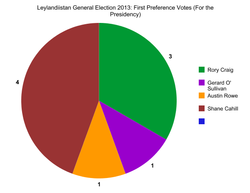Leylandiistani general elections, 2013
| |||||||||||||||||
7 seats in the National Assembly of Leylandiistan | |||||||||||||||||
|---|---|---|---|---|---|---|---|---|---|---|---|---|---|---|---|---|---|
| Turnout | 75% | ||||||||||||||||
| |||||||||||||||||
 First preference votes in the presidential election | |||||||||||||||||
| |||||||||||||||||
The 2013 Leylandiistan general elections were the first ever democratic elections in the history of Leylandiistan. The voter turnout was 75%. Voting took place over a number of days, and culminated in Fionnbarra Ó Cathail's election as the First President of Leylandiistan. The Leylandiistan Electoral Commission presided over the election. The election was a first past the post (FPTP) election, meaning the winner and runner up of the first preference votes were elected President and Vice President respectively.
Background and Election
When Leylandiistan seceded from Ireland, Ruairí de Créag and Fionnbarra Ó Cathail agreed to share power. Instead of having one head of state, Leylandiistan was a diarchy, with two co-consuls as heads of state and government, holding absolute power. The National Assembly of Leylandiistan became the legislature of Leylandiistan. The Power Sharing Agreement was to terminate as soon as the results of a democratic election were known. Initially, this election was scheduled for June 1, 2013, but conflicting arrangements meant that this was delayed. However, the election date of August 7 was announced at the end of July.
The campaign was not as exciting as expected, as the LeyTV debate was cancelled due to technical difficulties. SALDAL (now called an Conradh Daonlathais) made two election posters, and both SALDAL and CDP issued election statements and circulated an election email message. The online ballot opened on the 7th of August, and voting continued until the 12th. The newly formed Electoral Commission counted all the votes, and produced a graph of results within hours of the ballot box closing. The turnout of 75% was slightly lower than anticipated.
Fionnbarra Ó Cathail's election was a narrow one. He beat Ruairí de Créag by just one vote. In third and fourth place came Norma O' Connor and Ursula O' Sullivan, and Hugh Murray, Gerard O' Sullivan and Hugh Murray all came trailing behind. Brian Murray and Marian O' Connor did not meet the quota, and they were eliminated. The rest were elected to the National Assembly.
Method of Election
The Leylandiistan Electoral Commission devised a unique form of electing candidates, which was loosely based on the First Past The Post system. All candidates were on the one ballot paper nationwide. The candidate with the most first preference votes was elected President, and the runner-up became vice-president. Both offices also had seats in the National Assembly. The next five most popular candidates were also elected to the National Assembly. The sum of their first to fifth preference votes were added up, and the five people with the highest number of votes from this method were elected to the legislature. However, this method also meant that anyone who had even one first preference vote was guaranteed a seat in the National Assembly, as less than half of the candidates achieved a first preference votes, and because each preference was counted individually from first to fifth.
Criticism
Although the election itself was democratic, some criticised the way the Electoral Commission handled the election. Ruairí de Créag said that the ballot system was disorganised, and that the Commission was not very organised itself. The Commission was indeed set up at the last minute. He also said that it was not a secret ballot, as voters had to supply their email address along with their ballot paper. This was a feature widely criticised. Fionnbarra Ó Cathail, although he won, criticised the First Past The Post system as being unrepresentative, and only democratic to a point. He has advocated the use of the Proportional Representation system instead. Finally, there was a bit of confusion as to how the votes were counted, as only half of the candidates actually got first preference votes. The newly elected government has since vowed to put more organisation into elections in the future.


